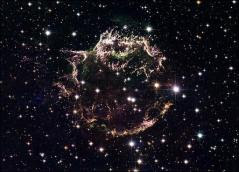
又到七夕織女會牛郎的日子,中國情人節,天上的牛郎織女星要怎麼看呢?願天下有情人終成眷屬。
May all lovers become couples.
Qi Xi also known as Magpie Festival, falls on the seventh day of the seventh lunar month on the
Chinese calendar; thus its name. It is sometimes called Chinese
Valentine's Day in recent years.Young girls traditionally demonstrate their domestic arts, especially
melon carving, on this day and make wishes for a good husband.The story of Cowherd and Weaver Girl--In late summer, the stars
Altair and
Vega are high in the night sky, and the Chinese tell the following love
story, of which there are many variations:A young cowherd named Niulang (
Chinese: 牛郎;
pinyin: niú láng; literally "the cowherd", the star
Altair) happens across seven fairy sisters bathing in a lake. Encouraged by his mischievous companion the ox, he steals their clothes and waits to see what will happen. The fairy sisters elect the youngest and most beautiful sister Zhinü (
simplified Chinese: 织女;
traditional Chinese: 織女;
pinyin: zhī nǚ; literally "the weaver girl", the star
Vega) to retrieve their clothing. She does so, but since Niulang has seen her naked, she must agree to his request for marriage. She proves to be a wonderful wife, and Niulang a good husband. They lived happily and had two children. But the Goddess of
Heaven (in some versions Zhinü's mother) finds out that a mere
mortal has married one of the fairy girls and is furious. (In another version, the Goddess forced the weaver fairy back to her former duty of weaving colorful clouds in the sky because she could not do her job while married to the mortal.) Down on Earth, Niulang is very upset learning that his wife is gone. Suddenly, his cow begins to talk telling him that if he kills him and puts on his hide, he will be able to go up to Heaven to find his wife. With tears flowing, he killed the cow, put on the skin and carrying his two children with him and off he went to the Heaven to find Zhinü. The Goddess found out he had come and was very angry. Taking out her hairpin, the Goddess scratches a wide river in the sky to separate the two lovers forever (thus forming the
Milky Way, which separates Altair and Vega).Zhinü must sit forever on one side of the river, sadly weaving on her loom, while Niulang watches her from afar and takes care of their two children (his flanking stars
β and
γ Aquilae or by their Chinese names Hè Gu 1 and Hè Gu 3).But once a year all the
magpies in the world take pity on them and fly up into heaven to form a bridge (
鵲橋, "the bridge of magpies",
Que Qiao) over the star
Deneb in the
Cygnus constellation so the lovers may be together for a single night, the seventh night of the seventh moon.It is said that if it rains on the night of Qi Xi, they are the tears of Niulang and Zhinü crying at the misery of their life.See also:
The Princess and the CowherdAs an interesting note, Barry Hughart's fantasy tale "
Bridge of Birds" is loosely based upon this celestial story, though the two figures are switched here. The girl is forced to remain on earth, and her male paramour in heaven. She is a peasant girl, and he shepherds the stars.(From Wikipedi
Qi Xi)






 颱風要來不來的天氣熱到爆,工作中不時需要室內外走動,氣溫過高時,濕度較高時很容易中暑。像今天我到下午3點多時,沒半點風太陽當頭照,我還沒做完手邊的事就感覺到頭一直熱起來,一陣陣的頭痛我知道我又"熱"到了。事情一時做不完也沒時間找人幫我刮痧(能刮痧最好),我倒了一大杯"熱"的酸梅湯(是熱的沒錯),喝了半杯就感覺到身上的燥熱漸漸消失了,喝完那一杯頭痛也好了,這不是什麼神奇的事,只適用在剛剛熱到時,如果已經非常嚴重時,一定要刮痧,這是我的經驗談。不過這也不能喝太多會傷腎。a popular treatment for sunstroke by scraping the patient's neck, chest or back .
颱風要來不來的天氣熱到爆,工作中不時需要室內外走動,氣溫過高時,濕度較高時很容易中暑。像今天我到下午3點多時,沒半點風太陽當頭照,我還沒做完手邊的事就感覺到頭一直熱起來,一陣陣的頭痛我知道我又"熱"到了。事情一時做不完也沒時間找人幫我刮痧(能刮痧最好),我倒了一大杯"熱"的酸梅湯(是熱的沒錯),喝了半杯就感覺到身上的燥熱漸漸消失了,喝完那一杯頭痛也好了,這不是什麼神奇的事,只適用在剛剛熱到時,如果已經非常嚴重時,一定要刮痧,這是我的經驗談。不過這也不能喝太多會傷腎。a popular treatment for sunstroke by scraping the patient's neck, chest or back .








 Julian Beever is an British artist that draws on the street. His images are drawn in such a way which gives them the illusion of a three dimension look. It has given him fame around the world and by now people name him pavement Picasso. A video of how Julian makes his draws can be seen here. More information about the used techniques can be read on Wikipedia: Trompe-l'œil and Anamorphosis.
Julian Beever is an British artist that draws on the street. His images are drawn in such a way which gives them the illusion of a three dimension look. It has given him fame around the world and by now people name him pavement Picasso. A video of how Julian makes his draws can be seen here. More information about the used techniques can be read on Wikipedia: Trompe-l'œil and Anamorphosis. 又到七夕織女會牛郎的日子,中國情人節,天上的牛郎織女星要怎麼看呢?願天下有情人終成眷屬。
又到七夕織女會牛郎的日子,中國情人節,天上的牛郎織女星要怎麼看呢?願天下有情人終成眷屬。